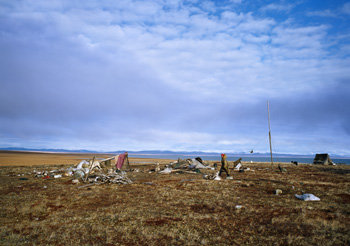Carlos Casas
dal 13/6/2008 al 31/8/2008
Segnalato da
13/6/2008
Carlos Casas
Galerie Davide Gallo, Berlin
Siberian Fieldworks. There are two pillars that underpin the narration of Casas: Man and Nature. There is no antagonism between them, but rather a mutual understanding. He recalls the romantic myth of the State of Nature, and enriches it in a modern and anthropological sense.

On June 14th, 2008, galerie davide gallo has the pleasure of presenting a solo show by the Spanish artist Carlos Casas.
Seduced by the image of cinema, the gaze of Carlos Casas runs through the years in which this art drew its meaning not from the aesthetic ability to develop facts, but from the courage to tell their truth. We are reminded of 'Flaherty' 'Nanook From the North' and 'Man of Aran', where the fight against the forces of Nature and the desire to control it, has been reduced to just trying to deal with events as they come in order to survive. In compliance with this high tradition, also to satisfy his own personal narrative needs.
In accordance with this high tradition, and also to satisfy his own personal narrative needs, the aesthetics of Carlos Casas almost does not process the raw film material; rather, his film is a natural flowing of time and places. In fact, the artifices and techniques related to post-production are almost completely absent, leaving the film free to run according to a spontaneous logic. The editing tends to respect the natural rhythm of events. There isn't elaboration: Carlos Casas ensures us that reality is already magical in and of itself; we need just the right perspective.
There are two pillars that underpin the narration of Casas: Man and Nature. There is no antagonism between them, but rather a mutual understanding.
Casas recalls the romantic myth of the "State of Nature", and enriches it in a modern and anthropological sense. The Spanish artist, in fact, documents the lucid awareness that his heroes have beeing confronting themselves with Nature so concretely, without idealism. This is the case of the sequence with the reindeers in "Tundra" and in the hunt of the whales in "Hunters since the beginning of Time". This "practical" dialogue of archaic societies and Nature has nothing unscrupulous or aggressive. Man and Nature are two old friends forced against their will to play a game: one wins today, tomorrow wins another. From a syntactical point of view it is worth noting that the visual aspect alone is not sufficient to render merit to the sublime art of Carlos Casas. The soundtrack plays a decisive role in the syntax of the film, with ambient sounds, minimal compositions and often live-sets. (One is reminded of this set on the boat of the PS1 in June 2007 during the opening of the Biennale of Venice). This is not simply a soundtrack, but a pure aesthetic experience. The track neither guides nor emphasizes the image, but has its own autonomy. At the same time, however, it is never anarchic. Rather, it always aims to suggest an alternative path of perception. With regard to style, it is worth emphasising must specify that Carlos Casas often builds his films in order to arrange a sequence more sensitive to the internal and independent gramatic of the work than to its exterior plausibility. The film refers to its own internal laws of gravity; whether these impose a different rhythm, divided into two or three channels of projection, Carlos Casas does not hesitate to impart the necessary explaining tools to his work.
Being such master of style is not (and is never) a celebration of his own capacity, but rather a humble desire to engulf the onlooker in an amplified emotion - a place where the meaning of things is lost and the horizons bleed. Where few tracks survive, we are reminded of one terrestrial, and then a divine, sense of Nature.
Carlos Casas has participated in noteworthy events such as: Pan Screening, Palazzo delle Arti di Napoli, curated by Julia Draganovic, Music in progress, Centre d'art Contemporani de Barcelona, Locarno Film Festival, Forward Fendi, Fondazione Alda Fendi, curated by Andrea Bruciati, Netmage Bologna, Daydream Fields, curated by Andrea Lissoni, Fondazione Buziol, Venice, Italy.
Opening 14th June 2008
Galerie Davide Gallo
Linienstrasse 156 - Berlin
Free admission



